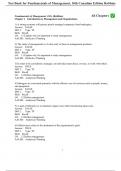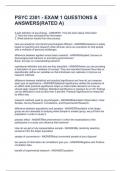Exam (elaborations)
Test Bank for Fundamentals of Management, 10th Canadian Edition by Stephen P. Robbins
- Course
- Management
- Institution
- Management
Test Bank for Fundamentals of Management, 10ce 10th Canadian Edition by Stephen P. Robbins, David A. DeCenzo, Mary A. Coulter, Ian Anderson. Full chapters test bank (Chapter 1 to 13 + Supplement A,B,C) are included. 1 Introduction to Management and Organization Supplement 1A A Brief History of ...
[Show more]




